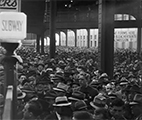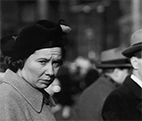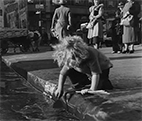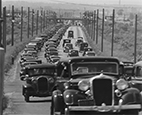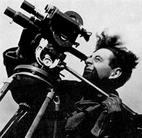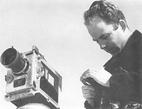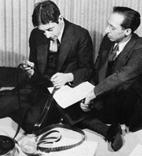The City - 3 sequences - Ralph Steiner
- Unseen Cinema Collection |
- 1939 |
- 17 minutes |
- B&W |
- SOUND
Rental Format(s): Digital File
The City - 3 excerpts: The Industiral City - Pittsburgh (3:26 min)
The Metropolis - New York City (9:35 min)
The Highway - New York/New Jersey weekend traffic (2:23 min)
Co-makers: Ralph Steiner, Willard Van Dyke, Pare Lorentz, Lewis Mumford, and Henwar Rodakiewicz
Assisted by Roger Barlow, John Flory, and Theodore Lawrence
Production: American Documentary Films, Inc.
Original format: 35mm sound film 1.37:1
Narration: Morris Carnovsky
Music: Aaron Copland
Courtesy: The Museum of Modern Art
The poetic commentary addresses the social problems of modern life circa 1939 in three distinct urban environments: Pittsburgh steel mills, Manhattan city streets, and a New York/New Jersey weekend traffic jam. The exquisite cinematography and editing are greatly enhanced by Aaron Copland's original score. The City played exclusively at the 1939-40 World's Fair in Flushing Meadows, New York to become one of the most widely seen and discussed documentary films before the advent of television. -Bruce Posner
Ralph Steiner (1899-1986), educated at Dartmouth, became a successful commercial and much honored fine art photographer. He made perhaps the first American abstract film, H2O (1929), following it with other experiments, some political in nature, some in Hollywood. Steiner also photographed The Plow That Broke the Plains (1936) and co-directed and photographed The City (1939) with Willard Van Dyke. -Robert A. Haller
Willard Van Dyke (1906-1986), a photographer by age 12, formed in 1932 with Ansel Adams, Edward Weston, and Imogen Cunningham the pivotal West Coast photography group f/64. Moving East, he became a noted documentary film-maker working closely with Pare Lorentz and Ralph Steiner among others. Hands may be his first completed film. -Robert A. Haller
Henwar Rodakiewicz (1903-1976), from the mid-1920s when he made Portrait of a Young Man until his innovative experiments in TV documentary, remained in the forefront of independent American filmmaking. As a writer, editor, and director, he was celebrated for exploiting the beauty inherent in his material and for his uncompromising honesty. -Irving Jacoby
Aaron Copland (1900-1990), one of America's most beloved and accomplished composers, played a crucial role in the coming of age of American music. A conductor, music critic, and teacher who wrote clearly about music, Copland composed some of the twentieth century's most familiar works, Billy the Kid, Rodeo, Appalachian Spring, and Fanfare for the Common Man. -John Rockwell



